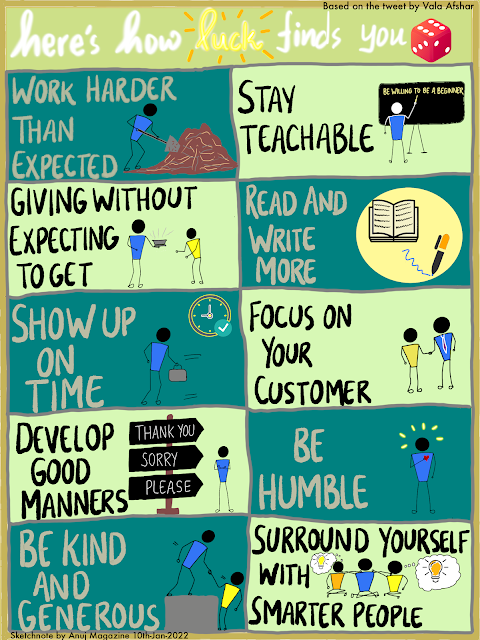My work was featured at my current company's newsletter. Sharing the contents i shared below-
About Sketchnoting:
I have been hooked on to an art-form called as Sketchnotes for last 2-3 years now. For Starters, Sketchnotes are the rich visual notes created from a mix of handwriting, drawings, hand-drawn typography, shapes and visual elements like arrows, boxes, and lines. My choice of subject- I like to Sketchnote timeless ideas- the ideas that are as relevant now as they will be 20-30-40 years from now.
Sketchnotes helps to:
- Simplify the complex
- Enables connection and synthesis of ideas
- Raises attention and engagement
- Organizes and summarizes insights
- Eases clarity and comprehension
- Enables quick grasp and better memory retention of concepts
- Easily share and communicate
Where can you find my work:
You can find some of my work at LinkedIn or at my blog
Inspiration behind my journey:
For me, pursuing Sketchnotes as an interest really came in at the intersection of 3 of my other interests- Reading, Writing, Story-telling. Let me briefly share my journey.
1. I have been an avid reader for as long as I can remember but 4-5 years back i got a sense that reading wasn't energizing me as much. Upon introspection, i realized that i was probably reading more than i should (am even guilty of chasing vanity goals like reading xx books a year). During this phase, by sheer coincidence, i came across this mindset changing blog- "Consume less, Create more". In summary, this blog was about mindful consumption (reading, watching videos etc.) and doing something meaningful with the reading you do (i.e. synthesize, create and share). With most social media apps having infinite scroll as a default feature, we are on an never-ending consumption treadmill every day. To preserve sanity, it is important to be intentional about what we let inside our minds and engage our minds meaningfully by creating something. Once I understood this, it created a big shift in me.
2. I love to handwrite. A virtue that is becoming rarer by the day. To take my interest forward, I pursued and completed a professional qualification in Handwriting Analysis back in 2005 and since then found ways to leverage this skill and also continued to hand-write.
3. Who doesn't like listening to stories. Stories have a power to improve the comprehension and amplify the message. Around 2013-14, I had an part time stint at Tech Journalism (people reached out seeing some of my work shared online) that helped me develop and improve story-telling.
Once i discovered the art-form called Sketchnoting, it really brought the above 3 aspects together and I was hooked.
What i learned from my journey so far-
"Follow your Passion" is an overrated advice. To sustain any interest and achieve mastery, the purpose alignment is paramount. Purpose is unique to ourselves based on our life stories and experiences.
The story behind the “The bosses we remember” Sketchnote:
I drew this sketchnote because I loved the ideas shared here. Little did I knew that this will resonate so much with the audience. Even now, after an year or so of creating this, I get this in my WhatsApp groups and being constantly referred to at LinkedIn. It probably raked in multi-million views and shares. More that virality, what struck me was that this Sketchnote helped create conversations between great managers and their teams and evoked nostalgia. Made me truly humbled to observe how many memories and past connections this simple visual was able to rekindle.
The Story after Editing:


